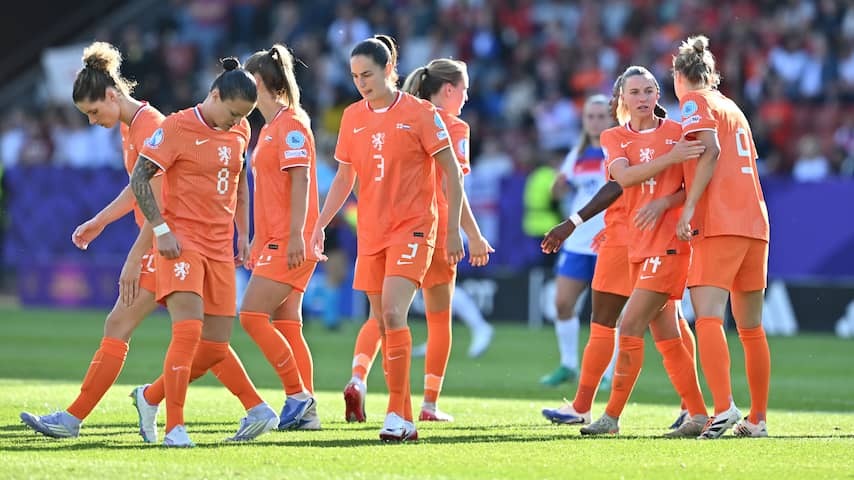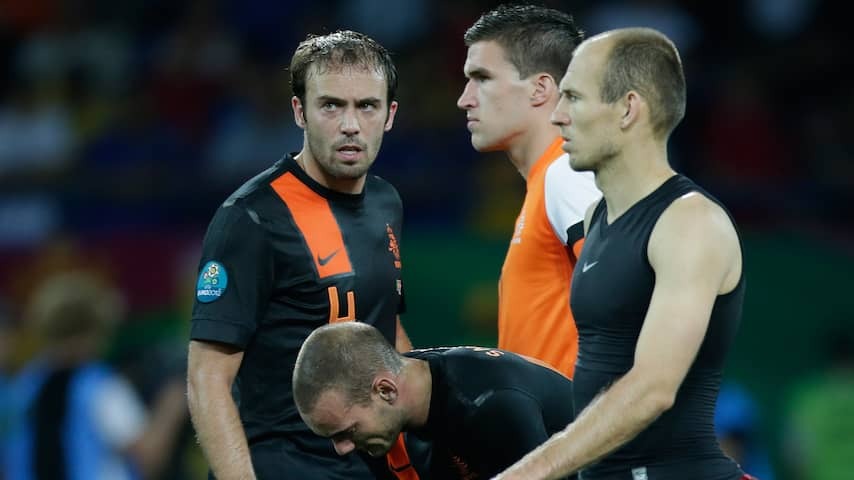
On Sunday evening, the Orange is most likely to win three goals difference from France to get the quarterfinals of the European Championship. How do you tackle a competition in which you have to score a lot? “We put Virgil van Dijk in the rush.”
The ‘Remontada’ of FC Barcelona in 2017 was the subject of conversation at the staff of the Dutch national team in 2017. In 2017, Barcelona made a 4-0 defeat in Paris in the Champions League by winning 6-1 at home.
According to Jonker, that match shows that miracles are possible in football. “Whether you play in Jos Watergraafsmeer 3 or at Barcelona; sometimes you play matches in a way that develop how you absolutely do not expect it,” said Jonker at the press conference towards the game with France of Sunday.
Jonker hopes that Wales will waste points against England, making a minimal victory in France enough for the Orange. But the national coach thinks that Wales is not good enough for that and that the Orange will have to win with three goals difference from France. “We need Basel’s miracle.”
As coach of Excelsior, Marinus Dijkhuizen was close to ‘Het Mirakel van Kralingen’ two seasons ago. His team had to win against NAC in the final of the play-offs for promotion/relegation with four goals difference to drag out an extension, after a 6-2 defeat in the first game.
“We have completely changed our setup,” Dijkhuizen recalls. “We played with four strikers and a midfielder as a left back. On our side there were only four defensively set players on the field.”
The Dutch men’s team made no changes at the 2012 European Championship in Ukraine and Poland. Van Denmark and Germany were lost in the group stage, so that the team of national coach Bert van Marwijk had to win the last group match against Portugal with two goals difference to continue.
“We didn’t do anything crazy,” says Joris Mathijsen, who was a basic player at the time. “We came for 1-0 via Rafael van der Vaart, but we still lost 1-2. We consciously chose to go for the zero first. If we didn’t score in the first 45 minutes, we would do it differently after the break.”
For example, Erwin van de Looi also tackled it as an assistant trainer at FC Groningen in 2011. After a 5-1 defeat against ADO Den Haag, the Groningers had to win in the play-offs to win European football with a minimum of four goals difference. In a 1-1 score at half time, the Looi and head coach Pieter Huistra made a remarkable move.
“We put Virgil van Dijk in the rush,” says Van de Looi. “In all honesty: it was pure coincidence. Virgil never stood in the rush. But that action caused confusion at ADO. Virgil scored twice.”
But should the Dutch have to play with a defender, for example, in the attack to cause confusion? Mathijsen does not think so. “You shouldn’t blow yourself up,” he says. “A goal goal may be deadly. You better attack in a controlled way and let it score in the game.”
As a coach of Willem II, Jonker has already experienced what it is like to strike several times in the final phase. “We were at 0-0 in a match against Vitesse fifteen minutes before the end. We finally won 4-0. For something like that I would now draw again.”
The question is how the Orange players respond if the team is once on the required lead. “We arrived at 4-0, but then it fell silent,” says Dijkhuizen. “It was so much about those four goals in the run-up. Once we had scored them, the energy fell away. Then NAC scored the 4-1 and we could not return.”
FC Groningen arrived at 5-1 and forced an extension, but also failed to push on. Van de Looi: “We suddenly had the feeling that we had something to lose. It was something psychological. ADO eventually won after penalties.”
Although the Orange of 2012, Excelsior and FC Groningen did not achieve their final goal, the belief was that it was there before. After the reduction against England, Jonker faces the heavy task of making his players believe in a ‘miracle of Basel’.
“That faith is essential,” says Dijkhuizen. “Our video analyst fueled that at the time with a compilation of competitions in which a team came back. From unknown teams to Barcelona and that Remontada.”
The Orange players of 2012 got inspiration from a dinner with the selection. “Especially for that dinner, Mark van Bommel had figured out which teams had come back from such a position. Those words inspired us.”
The difference is that the Orange was equivalent to Portugal in 2012, while the orange women on paper are less than title candidate France. According to Van de Looi, the Orange team therefore needs a good portion of happiness on Sunday.
“ADO came to Groningen at 95 percent, because they thought they were already there. That made it exciting. At that laziness, the Orange also has to hope for France.”
On Sunday Evening, Oranje Will Most Likely Have to Win Against France with a Three-Goal Difference to Reach the Quarter-Finals of the European Championship. How do you approach a match in which you have to score a lot? “We draw Virgil van Dijk in The Striker Position.”
The ‘Remontada’ or FC Barcelona in 2017 has a topic of discussion Among the Staff of the Dutch National Team in Recent Days. In 2017, in The Champions League, Barcelona Reversed A 4-0 defeat in Paris by Winning 6-1 at Home.
Accordance to Jonker, That Match Shows That Miracles Are Possible in Football. “Whether you play in Jos Watergraafsmeer 3 or at Barcelona; Sometimes you play matches in a way that developops in a way you absolutely don’t expect,” Jonker Said at the Press Conference Leading Up To Sunday’s Match Against France.
Jonker Hopes That Wales Will Lose Points Against England, So That A Minimal Victory Over France is Enough for Orange. But the national coach Thinks that Wales is not good Enough for that and that orange will have to win against France with a three-goal Difference. “We need the miracle of basel.”
Marinus Dijkhuizen, as coach of Excelsior, was close to ‘the miracle of kralingen’ two seasons ago. HIS team had to win Against NAC in the Final Of The Play-Offs for Promotion/Relegation with a Four-Goal Difference to Force Extra Time, After A 6-2 Defeat in the First Leg.
“We completely Changed Our Line-Up,” Dijkhuizen Recalls. “We play with four strikers and a midfielder as left back. On our side, there were only four defensively minded players on the field.”
The Dutch Men’s team did not make any changes at the European Championship in Ukraine and Poland in 2012. They Lost to Denmark and Germany in the Group Stage, which coach Bert van Marwijk’s team had to win the last group match againste-with a two-goerate.
“We Didn’t Do Anything Crazy,” Says Joris Mathijsen, who was a basic player at the time. “We took The Lead 1-0 via Rafael van der Vaart, but we Still Lost 1-2. We deliberately chose to go for the zero first. If we did not score 45 minutes, we would do things differently after the break.”

Erwin van de Looi also approached it that way as assistant trainer at FC Groningen in 2011. After a 5-1 defeat against ADO Den Haag in the play-offs for European Football, Groningen had to win four goals difference. At a 1-1 score at half-time, from De Looi and Head Coach Pieter Huistra Made a Remarkable Move.
“We draw Virgil van Dijk in The Striker Position,” Says van de Looi. “In All Honesty: It was Pure Coincidence. Virgil was never in the striker position with us. But that action Did Cause Confusion at ADO. Virgil Scored Twice.”
But should orange, for example, play with a defender in Attack to Cause Confusion? Mathijsen Doesn’tn’t Think So. “You shouldnn’t blow yourself up,” he says. “A Goal Against is Possible Fatal. You’d Better Attack in a controlled manner and score late in the match.”
As Coach of Willem II, Jonker Has Experienced what it is like to strike Several Times in the Final Phase. “We were 0-0 in a Match Against Vitesse a Quarter of An Hour Before Time. We won any vally 4-0. I would sign for something like that again now.”
The Question is How the Oranje Players Will React If The Team is Once On The Required Lead. “We come to 4-0, but then it Went Silent,” Says Dijkhuizen. “There was so much talk about goals in the run-up. Once we had made them, the energy disappeared. After that nac scored the 4-1 and we could come come back.”
FC Groningen Came to 5-1 and Forced an Extension, but also failed to break through. Van de Looi: “We had Suddenly the Feeling that we had something to lose again. It was something psychological. ADO Anygell won after penalties.”
Althegh the Oranje or 2012, Excelsior and FC Groningen Did Not Achieve Their Final Goal, The Belief That It was Possible was there in Advance. After the Humiliation Against England, Jonker Faces The Difficult Task of Making His Players Believe in A ‘Miracle of Basel’.
“That faith is essential,” Says Dijkhuizen. “Our video analyst then fueled that with a compilation of matches in which a team came back from a beeten position. From unknown teams to barcelona and that remontada.”
The Oranje Players of 2012 Took Inspiration from a dinner with the selection. “Especiate for that dinner, Mark van Bommel had Figure Out which teams had all come back from such a position. Those words inspired us.”
The Difference is that Oranje In 2012 was Equal to Portugal, While the Orange Women Are on Paper Less Than Title Candidate France. Accordance to Van de Looi, Oranje Therefore Needs A Good Portion of Luck on Sunday.
“ADO Came to Groningen at 95 percent, because they thought they were already there. That made it exciting. Orange must also hope for that complacency against France.”